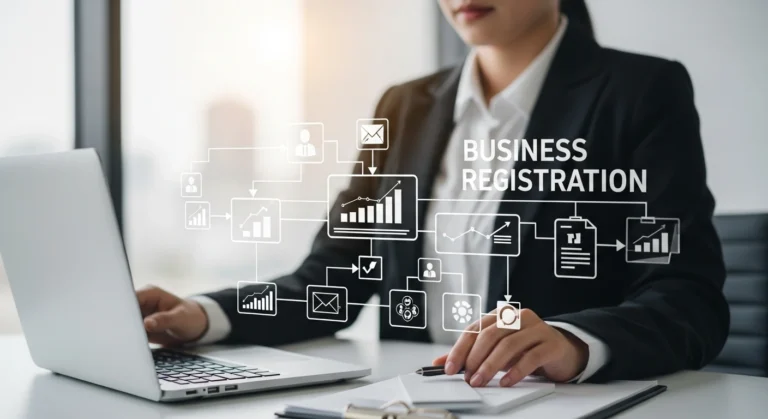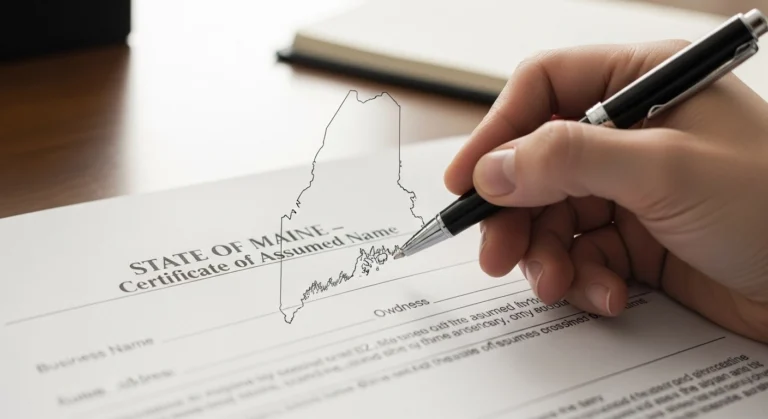An Employer Identification Number (EIN) is a unique nine-digit number assigned by the IRS to business entities in the United States. It’s essentially the Social Security number for your business, a unique identifier used for a variety of federal tax purposes. This number is formatted as XX-XXXXXXX.
The EIN is a foundational piece of your business’s legal and financial identity. While its primary purpose is to help the IRS track and process tax returns, it’s also a crucial tool that unlocks several essential business functions. Without an EIN, you can’t legally hire employees, open a dedicated business bank account, or file certain types of tax forms.
Think of it this way: just as your Social Security number identifies you as an individual to the government, an EIN identifies your business as a separate, official entity. It’s a key step in separating your personal and business identities, which is vital for legal protection and financial clarity.
Key Purpose of an EIN
The main purpose of an EIN is to identify your business to the IRS and other government agencies for tax filing and reporting. This is a broad responsibility that includes:
- Filing Federal Taxes: The EIN is required on all your federal tax forms, including income, employment, and excise taxes.
- Hiring Employees: You must have an EIN to pay wages and file employment tax returns, such as Form 941 (Employer’s Quarterly Federal Tax Return).
- Applying for Business Licenses: Many state and local agencies require an EIN to issue business licenses and permits.
By providing a clear and professional identifier, the EIN simplifies the entire process of business compliance and ensures that your operations are fully transparent to the government.
Why Do You Need an EIN?
Whether you are legally required to have an EIN or not, there are significant benefits to getting one. It’s a crucial step for establishing your business’s legitimacy and financial independence.
The Legal Requirements: When an EIN Is Mandatory
The IRS requires a business to have an EIN in several situations to ensure proper tax reporting and compliance. You are legally required to get an EIN if your business:
- An EIN is necessary to file payroll taxes and handle employee wage reporting
- Business structures are legally separate from their owners and must have an EIN
- Withholds taxes on income paid to non-resident aliens
- Operates specific types of organizations such as trusts, non-profits, or estates
Practical Reasons (Even if Not Required): The Smart Choice
Even if your business structure doesn’t legally require an EIN (like most sole proprietorships), obtaining one is highly recommended for several practical reasons.
- Opening a Business Bank Account: Most banks require an EIN to open a dedicated business account, which is essential for keeping your personal and business finances separate.
- Building Business Credit: An EIN allows you to establish a credit history for your business, independent of your personal credit. This is vital for securing future loans or lines of credit.
- Protecting Your Personal Social Security Number (SSN): Using an EIN on business documents, invoices, and forms reduces the risk of identity theft by keeping your personal SSN private.
- Establishing a Professional Image: An EIN signals to vendors, clients, and partners that your business is legitimate and serious, adding a layer of credibility.
- Applying for Business Licenses and Permits: Many federal, state, and local agencies require an EIN to issue the necessary licenses and permits for your industry.
Who Needs an EIN?
While many business entities are required to have an EIN, there are specific situations where it’s either mandatory or simply a smart move.
Required
The IRS legally requires an EIN if your business meets any of the following criteria:
- You have employees: This is the most common reason and is mandatory for managing payroll and employment taxes.
- Your business is a partnership or a corporation: These structures are legally separate from their owners and must have an EIN.
- You file specific tax returns: This includes returns for excise taxes, alcohol, tobacco, and firearms.
- You are a multi-member LLC: Multi-member LLCs are automatically treated as partnerships for tax purposes and are required to have an EIN.
Optional But Recommended
If you are a sole proprietor with no employees, you are not legally required to get an EIN. Here, you can use your Social Security Number (SSN) as your business’s tax ID. However, getting an EIN is recommended for several key reasons:
- Separates Finances: It helps you maintain a clear separation between your personal and business finances, which is crucial for bookkeeping and in the event of a lawsuit.
- Protects Privacy: Using an EIN on business documents like W-9 forms helps protect your personal SSN from potential identity theft.
- Professionalism: An EIN gives your business a more professional and legitimate appearance when dealing with banks, vendors, and clients.
- Future Growth: It’s a key step for opening a business bank account and is necessary if you ever decide to hire employees or change your business structure in the future.
How to Apply for an EIN: A Step-by-Step Guide
Applying for an EIN is a straightforward process, and the fastest way to get one is online directly from the IRS. Here’s a step-by-step guide to walk you through it.
Step 1: Preparation
Before you begin, gather the necessary information about your business. You’ll need:
- Legal Business Name and Mailing Address.
- The Name of the Responsible Party and their Social Security Number (SSN), Individual Taxpayer Identification Number (ITIN), or EIN. The responsible party is the individual who owns, controls, or manages the business.
Step 2: The Application Process
The IRS offers several ways to apply, but the online application is the best option for most people.
- Online (The Fastest Method): You can apply on the IRS website. The application is a secure, user-friendly process that takes about 15 minutes. Once you complete the application and it’s validated, your new EIN is issued immediately. This method is available for all businesses with a principal place of business in the U.S. or U.S. territories.
- Other Methods: If you’re an international applicant, or for other specific reasons, you can also apply by fax (it takes about four business days), mail (processing takes about four weeks), or by phone for international applicants only.
Step 3: The Cost
Applying for an EIN is completely free when you go through the official IRS website. Be wary of third-party websites or services that charge a fee to get an EIN for you. There is no need to pay for this service, as the IRS provides it at no cost.
Common Questions & Scenarios
Do I Need a New EIN?
A new EIN is typically needed when the business’s ownership or legal structure changes. For example, if you change from a sole proprietorship to a corporation, a new EIN is required because the IRS now views it as a distinct legal entity. However, a new EIN is not necessary for minor changes like a business name change or a new physical location.
How Can I Find a Lost EIN?
If you’ve misplaced your EIN, there are several ways to retrieve it. You can check your original EIN confirmation notice, past federal tax returns, or old business bank account statements. If you can’t locate it in your records, you can call the IRS Business and Specialty Tax Line at 800-829-4933. They can provide the number over the phone after verifying your identity as a principal officer or authorized party.
Can a Non-US Citizen Get an EIN?
Yes, non-US citizens can absolutely obtain an EIN. There is no citizenship or residency requirement to get one. While US citizens and residents can apply online using their Social Security Number (SSN), non-US citizens without an SSN can apply via phone, fax, or mail using a completed Form SS-4. International applicants should have their personal identifying information, such as their passport number, ready for the application.
The Bottom Line: Your Key Takeaways
An Employer Identification Number (EIN) is more than just a number. It’s the bedrock of a legitimate and compliant business in the United States. Think of it as a key that unlocks your ability to operate legally, manage your finances, and build a professional brand.
Getting your EIN is one of the most crucial first steps you can take after deciding on your business structure. Don’t wait until you’re ready to hire or file taxes.
By applying early, you streamline other essential tasks like opening a business bank account and securing the necessary permits. This simple, free step ensures you’re on a solid legal and financial foundation from day one, allowing you to focus on growing your business with confidence.




